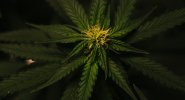CBD instead of a flu vaccine, instead of a vaccine for SARS-Cov-2, or perhaps as a universal vaccine against all autoimmune diseases? We won't go that far, but... the news that CBD oil helps us fight off various germs and defend ourselves against disease is scientifically proven.
Cannabidiol (CBD), in its most popular commercial form appearing as CBD oil, is the best that hemp gives us. This substance has no psychoactive effects, so it is fully legal to produce, sell and, of course - use, it turns out instead to be a great natural dietary supplement, effective in many situations.
After all, cannabidiol has wide-ranging effects - it calms down, quiets anxiety, regulates appetite, improves memory, restores healthy sleep, aids muscle recovery after workouts, shows anti-inflammatory, anti-bacterial, anti-tumor effects....
How is this possible? Well, the secret lies in the cooperation of hemp-derived cannabidiol with our internal endocannabinoid system.
CBD oil and the endocannabinoid system
The endocannabinoid system is perhaps the most mysterious of our body's systems. This is because it consists of receptors scattered throughout the body, signaling substances and enzymes responsible for their formation and breakdown. This system is sometimes referred to as the guardian of the body's homeostasis (or balance).
As such, the endocannabinoid system works together with other important systems in our bodies - such as the neurological, endocrine, circulatory and immune systems. If everything on the endocannabinoid-immune system line is working properly, we are immune "on point" - we don't succumb to microbes, we don't get cancer or autoimmune diseases.
Interestingly, the cooperation between the endocannabinoid and immune systems can be effectively supported. Such a natural "booster" is precisely hemp cannabidiol. This is because it turns out to be confusingly similar to the cannabinoids - signalers of the endocannabinoid system - produced by our body.
How CBD oil supports the human immune system
A growing body of scientific research indicates that hemp-derived cannabidiol supports, but also regulates, the immune system in several ways:
- first, it regulates its function
This means that the presence of CBD in the body stimulates the immune system to work when it is "lazy," so that we are better prepared to encounter pathogens such as the flu virus or SARS-Cov-2.
However, there are times when the human immune system works too hard. When this happens, an over-strong response (the so-called "cytokine cascade") can occur in response to a viral infection, which not only does not help fight the germ, but can also prove dangerous to the body. Cannabidiol prevents the occurrence of such a cytokine cascade.
CBD is also proving to be the body's ally in so-called autoimmune diseases, such as lupus, type 1 diabetes or Crohn's disease. These occur when a highly stimulated immune system begins to fight its own body. Cannabidiol can effectively calm such overactivity and help treat such diseases.
- Second - it aids in the elimination of cancer cells
Here comes a tricky word: apoptosis, or programmed cell death. This is a natural phenomenon to which most of our cells are subject. Most, because, for example, cancer cells are, after all, our own cells that have managed to "escape" apoptosis. Studies indicate that in the presence of CBD, this process can be reversed - cancerous cells... die.
- third - cannabidiol proves effective as an antibiotic
In recent experiments at the University of Queensland in Australia, the bactericidal and bacteriostatic effects of the natural cannabinoid cannabidiol were confirmed. So it turns out that taking it also makes profound sense when we are already sick - it will help our body fight bacteria and, for example, in the case of flu, can prevent a secondary infection with bacteria. As a result, we will recover faster.
Scientific sources:
- The antimicrobial potential of cannabidiol
- Cannabidiol promotes apoptosis via regulation of XIAP/Smac in gastric cancer
- Cannabinoids as novel anti-inflammatory drugs
- Cannabinoids and autoimmune diseases: A systematic review










